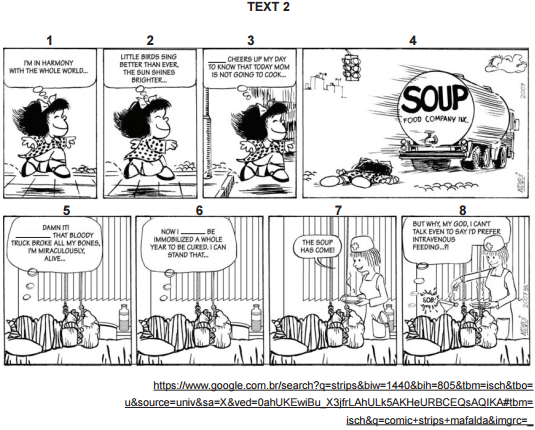Questões de Vestibular
Sobre pronome relativo | relative clauses em inglês
Foram encontradas 23 questões

https://www.theguardian.com/environment/
2021/sep/27/


I - A palavra who (l. 49) poderia ser substituída por that, sem prejuízo da correção gramatical e do significado original do texto. II - A palavra what (l. 52) poderia ser substituída por which, sem prejuízo da correção gramatical e do significado original do texto. III- As palavras whom (l. 56) e them (l. 57) referem-se à mesma palavra.
Quais estão corretas?

IN THE MIDDLE OF THE 19th century, a relatively unknown author named Pedro Carolino rapidly gained intercontinental popularity over a small Portuguese-to-English phrasebook. English as She Is Spoke (or O novo guia da conversação em portuguez e inglez) was originally intended to help Portuguese speakers dabble in the English tongue, but was penned by a man who spoke little to no English himself. And, instead of helping Portuguese speakers learn a second language, it became a cult classic for fans of inept and unintentional humor.
It quickly gained notoriety among English speakers, including author Mark Twain, who wrote the introduction for the first English edition, published in 1883. Twain expressed his approval of the book, saying “Nobody can add to the absurdity of this book, nobody can imitate it successfully, nobody can hope to produce its fellow; it is perfect.”
It is presumed that Carolino wrote the book through the aid of a Portuguese-to-French dictionary and a French-to-English dictionary, using the former for an initial translation of a word or phrase from Portuguese, and the latter to convert it from French into English. The result, of course, is a mishmash of cloudy gibberish.
Perhaps the most notorious section of the book is an appropriately named chapter entitled “Idiotisms and Proverbs,” which again features phrases that vary between barely understandable and completely nonsensical. Examples of Carolino’s twice-translated proverbs include: “it is better be single as a bad company”; “there is no better sauce who the appetite”; and simply “That not says a word, consent”.
The book opens with a preface written in a peculiar style of English. It details the book’s intended audience, stating that it “may be worth the acceptation of the studious persons, and especially of the Youth, of which we dedicate him particularly.” Perhaps predictably, English as She Is Spoke did not become popular among Portuguese-speaking students. In fact, it was never published in Portugal, although it did find an audience 133 years later in Brazil, when it was released as a comedy title.
Adaptado de LEIGHTY-PHILLIPS, Tucker. How a Portuguese-to-English Phrasebook became a cult comedy sensation. In: Atlas Obscura
(online). 29 jun. 2016. Disponível em www.atlasobscura.com
Em relação aos provérbios e expressões idiomáticas presentes no livro English as She Is Spoke, considere as afirmativas a seguir.
I. Os provérbios e expressões trazem jogos de palavras que fazem alusões a expressões em língua portuguesa que são interpretadas como irônicas pelo falante de português.
II. A tradução dos provérbios e expressões transforma as frases em combinações bizarras de palavras que fazem pouco sentido.
III. O efeito cômico também é atingido através de inadequações estruturais como, por exemplo, o uso incorreto de pronomes, como “who” e “ that”, que provocam um estranhamento no leitor falante de inglês.
IV. A escolha lexical inusitada dificulta a compreensão das frases pelo falante nativo de língua inglesa que as considera engraçadas por soarem incoerentes.
Assinale a alternativa correta.
Opportunity Cost
This phenomenon goes by the name of ‘opportunity cost,’ since by not investing in more equipment and a more rigid production flow, the company is forgoing the opportunity to earn increased profits. These costs are every bite as real as the payment of dollars out-of-pocket.
This notion _______ opportunity cost can be reinforced _________ a famous saying ______ Benjamin Franklin, no slouch himself _________ operations management. To make the point, however, we must make a brief excursion into logic. One truth of logic is the validity of the so-called contrapositive, which says simply that if the statement “If A, then B” is true, then it is also true that “If not B, then not A.” That is, of every time A occurs B follows, then we can be sure that if B does not occur, then A did not occur as well. Enough logic then, and back to Ben Franklin.
One of his Poor Richard sayings is that “A penny saved is a penny earned.” We have all recognized the truth of that since childhood, but I assert that by this saying Ben showed us he knows everything about opportunity cost. After all, what is the contrapositive of “A penny not earned is a penny not saved (i.e., a penny sent). All we are saying by this notion of opportunity cost is that “a penny not earned (an opportunity forgone) is a penny spent.” We shall often have occasion to consider opportunity costs, in analyzing and deciding various operations issues.
SCHMENNER, Roger W. Production/Operations Management. 5th
Edition. Prentice-Hall, 1993.
Supreme Court Expands Rights for Students with Disabilities
By Lauren Camera, Education Reporter - March 22, 2017. Adaptado.
 In a unanimous decision with majorn implications for students with disabilities, the U.S. Supreme Court ruled Wednesday that schools must provide higher educational standards for children with special needs. Schools must do more than provide a ‘merely more than de minimis’ education for students with disabilities and instead must provide them with an opportunity to make "appropriately ambitious" progress in line with the federal education law.
In a unanimous decision with majorn implications for students with disabilities, the U.S. Supreme Court ruled Wednesday that schools must provide higher educational standards for children with special needs. Schools must do more than provide a ‘merely more than de minimis’ education for students with disabilities and instead must provide them with an opportunity to make "appropriately ambitious" progress in line with the federal education law.
“When all is said and done,” wrote Chief Justice John G. Roberts, “a student offered an education program providing a ‘merely more than de minimis’ progress from year to year can hardly be said to have been offered an education at all.” He continued, citing a 1982 Supreme Court ruling on special education: “For children with disabilities, receiving an instruction that aims so low would be equivalent to ‘sitting idly... awaiting the time when they were old enough to drop out.’”
There are roughly 6.4 million students with disabilities between ages 3 to 21, representing roughly 13 percent of all students, according to Institute for Education Statistics. Each year 300,000 of those students leave school and just 65 percent of students with disabilities complete high school.
The case which culminated in the Supreme Court decision originated with an autistic boy in Colorado named Endrew. His parents pulled him out of school in 5th grade because they disagreed with his individualized education plan. Under federal law, the Individuals with Disabilities Education Act (IDEA), schools must work with families to develop individualized learning plans for students with disabilities.
While Endrew had been making progress in the public schools, his parents felt his plan for that year simply replicated goals from years past. As a result, they enrolled him in a private school where, they argued, Endrew made academic and social progress.
Seeking tuition reimbursement*, they filed a complaint with the state’s department of education in which they argued that Endrew had been denied a "free appropriate public education". The school district won the suit, and when his parents filed a lawsuit in federal district court, the judge also sided with the school district. In the Supreme Court case, Endrew and his family asked for clarification about the type of education benefits the federal law requires of schools, specifically, whether it requires ‘merely more than de minimis’, or something greater.
“The IDEA demands more,” Roberts wrote in the opinion. “It requires an educational program reasonably calculated to enable a child to make progress appropriate in light of the child’s circumstances.” *reimbursement – a sum paid to cover money that has been spent or lost.
In: <https://www.usnews.com/news/education-news/articles/2017-03-22/supreme-court-expands-rights-for-students-with-disabilitie> 30.03.2018
In picture 3, the pronoun “that” could have been omitted
without a change in meaning. Mark the alternative in
which “that” can NOT be omitted.
Leia o texto a seguir para responder à questão.
Migrant or Refugee? There Is a Difference, With Legal Implications
In the first half of this year alone, at least 137,000 men, women and children crossed the Mediterranean Sea to reach the shores of Europe, according to the United Nations. Thousands are traveling across the Balkans now. However, are they refugee or migrants? Does it make any difference? In search for these answers, let’s read the interview.
Q. Does it matter what you call them?
A. Yes. The terms “migrant” and “refugee” are sometimes used interchangeably, but there is a crucial legal difference between the two.
Q. Who is a refugee?
A. Briefly, a refugee is a person who has fled his or her country to escape war or persecution, and can prove it.
Q. What does the distinction mean for European countries?
A. Refugees are entitled to basic protections under the 1951 convention and other international agreements. Once in Europe, refugees can apply for political asylum or another protected status, sometimes temporary. By law, refugees cannot be sent back to countries where their lives would be in danger. “One of the most fundamental principles laid down in international law is that refugees should not be expelled or returned to situations where their life and freedom would be under threat,” the refugee agency said in a statement on Thursday.
Q. Who is a migrant?
A. Anyone moving from one country to another is considered a migrant unless he or she is specifically fleeing war or persecution. Migrants may be fleeing dire poverty, or may be well-off and merely seeking better opportunities, or may be migrating to join relatives who have gone before them. There is an emerging debate about whether migrants fleeing their homes because of the effects of climate change – the desertification of the Sahel region, for example, or the sinking of coastal islands in Bangladesh – ought to be reclassified as refugees.
Q. Are migrants treated differently from refugees?
A. Countries are free to deport migrants who arrive without legal papers, which they cannot do with refugees under the 1951 convention. So it is not surprising that many politicians in Europe prefer to refer to everyone fleeing to the continent as migrants.
Disponível em: <https://www.nytimes.com/2015/08/28/world/migrants-refugees-europe-syria.html?_r=0>. Acesso em: 15 set. 2015.

By Becky Oskin, Senior Writer. Adapted from http://www.
livescience.com/49262-indian-ocean-tsunami-anniversary.
html. December 26, 2014.
INSTRUÇÃO: A questão refere-se ao texto abaixo.
Victoria and Albert: how a royal love changed culture
By Lucinda Hawksley


Disponível em: <http://www.bbc.com/culture/story/20150623-victoria-albert-cultural-impact>.
Acesso em: 3 ago. 15. (Parcial e adaptado.)
( ) his (linha 28) refere-se a Albert (linha 27).
( ) they (linha 31) refere-se a artists (linha 30).
( ) whose (linha 35) refere-se a The queen (linha 34).
Assinale a alternativa que preenche correta e respectivamente os parênteses, de cima para baixo.
Excerpt 02: “One death was reported in São Paulo state, where a young man was run over by a SUV at an intersection during a demonstration, state police said.”
I. o termo “our” (l.2) é um pronome possessivo e refere-se aos leitores.
II. “which” (l.3) é um pronome relativo, na função de sujeito, e refere-se a “daily activities”.
III. os termos “useless” e “unwanted” (l.5) são formados por afixação.
IV. os modais “can” (l.5) e “may” (l.12) expressam a mesma ideia: possibilidade.
V. os marcadores discursivos “or” (l.3), “and” (l.5) e “but” (l.12) expressam, respectivamente, proporcionalidade, adição e condição.
A alternativa em que todas as afirmativas são verdadeiras é a:














